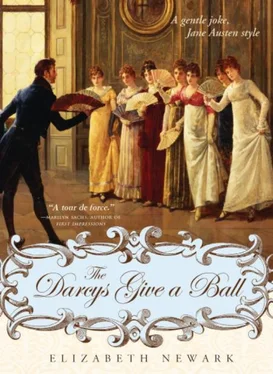“And I note, Mrs. Collins, the invitation is from Friday to Sunday. An honor indeed. Most obliging, most obliging. Such manners. Such condescension. Of course we shall all go.”
He held the invitation tightly in his hand as if he could not bear to put it down. A sweaty finger mark smudged one edge.
“Indeed, Mr. Collins. This may be a visit of great consequence,” said Charlotte. She did not look at Eliza. Under her calm exterior, she felt great excitement. This was the opening gambit. Pemberley had made the first move.
But Catty and Annie had already accepted an invitation to join the family of Annie’s affianced at Sanditon for the month of August. They were beside themselves with mortification.
When the Collinses’ acceptance was received by Elizabeth Darcy, it seemed that only Jonathan would accompany Eliza and her parents to the ball.
“So that is that,” said Elizabeth, giving the note to Juliet so that she could complete her lists. “Well, we shall see what we shall see.”
But Juliet’s mind was full of pink silk—or should it be white? Or yellow, primrose yellow! She knew how well she looked in yellow, a color trying to many young ladies; few would essay to wear it. Ruffles. Lace. Slippers to match the dress. It did not dawn on her that there was a purpose to the ball other than the celebration of her birthday. (In her way, Juliet was quite as self-absorbed as Mr. Collins.) And Gerard was coming, though Francis could not. All was right with the world.
Chapter Six
Arrival at Pemberley
They live in a handsome style and are rich...
She had never seen a place for which nature had done more,
or where natural beauty had been so little counteracted by an
awkward taste.
Jane Austen
The ball was to take place on Saturday, August 5th. Carriages began to arrive at midday on the 4th. Only a select few, of course, had been invited to stay from Friday to Sunday at Pemberley—that was for family—and the guest list for dinner on Saturday, immediately preceding the ball, was limited. Those living within comfortable traveling distance would arrive at 9:00 p.m.
The Collinses were among the first to arrive. Charlotte was always punctual. The door was flung wide and the butler and his minions were ushering them inside the main hall when Elizabeth swept down the grand staircase to greet them, with Juliet and Henry close behind. She was surprised to find Charlotte accompanied only by a young man of medium height and a small trim female figure, who must of course be Eliza. Mr. Collins was absent.
“Charlotte!” Elizabeth pressed her cheek against her friend’s. “I am so pleased to see you. I hope I see you well. And this is Eliza? And Jonathan?” Her voice ended on a note of inquiry, even as she took in Eliza’s small pointed face and large gray eyes, dancing in the shadow of her straw bonnet.
Oh dear, she thought. She is a charmer.
“Mr. Collins sends his deepest regrets. He is so sorry but a sudden attack of gout has quite incapacitated him. He dare not travel.”
Mr. Collins suffered periodically from gout, brought on by self-indulgence at the table. He was quite proud of it, considering it a sign of good breeding. But he had been bitterly disappointed that an attack should rob him of his first visit to Pemberley. He struggled out of bed on the morning of departure, but the pain in his foot was such that Charlotte firmly bade him return to his couch and remain there. He had also lately complained of a pain in his arm. She looked at his flushed face and noted his shortness of breath, symptoms that had been growing on him with his increase in girth and decrease in exercise. She dispatched a servant for Mr. Merryweather, the present Meryton apothecary, and made sure that Mrs. Spong, her housekeeper, fully understood her orders. Mr. Collins was to follow Mr. Merryweather’s instructions and was not to rise until Mr. Merryweather gave permission.
“My dear Mr. Collins,” said Charlotte. “I deeply regret the necessity of leaving you at such a time, but I fear we might well antagonize Mr. Darcy if none of us responds to his gracious invitation—the first such invitation.”
Mr. Collins groaned and assented.
“I leave you in the good hands of Mrs. Spong and Mr. Merryweather.
“I have only one consolation to offer you, Mr. Collins,” Charlotte went on. “The new number of Mr. Dickens’s periodical has arrived, containing the serial we find so interesting. I have not had time to peruse it. You must tell me all about it when I return.”
Mr. Collins approved of Charles Dickens’s novels; he had even been known to laugh at Mr. Pickwick’s comical adventures. Mr. Dickens perhaps made too much of the undeserving; Mr. Collins found no fault with workhouses and prisons as such but he was prepared to be compassionate at a distance: London was a good way off. The novel at present being serialized was The Old Curiosity Shop , and “What will happen to Little Nell?” was on everyone’s lips.
Mr. Collins eased himself back on his bank of goose-down pillows. The monogrammed linen cases, freshly changed at Charlotte’s direction that morning, were ironed to icy perfection by the laundry maid. He wiggled luxuriously; his gouty foot was protected by a wicker cage under the bedcovers. A pitcher of lemon-barley water stood within easy reach on the commode at his bedside, together with two fine linen handkerchiefs, and the latest number of the periodical Master Humphrey’s Clock was just visible poking out from under a copy of Fordyce’s Sermons. Everything was comfortable and orderly. Mr. Collins regarded his wife’s pleasant self-controlled face. He felt a sudden unexpected twinge of melancholy at the thought of her departure, not just because of all he would miss at Pemberley, but because he should be deprived of her calming presence. He himself had made numerous journeys alone over the years, leaving her at home, but not since the loss of her last baby son had she been the one to leave. How would he get on? It was of course, he told himself, a wife’s duty to minister to her husband’s well-being, but he had to admit that Charlotte was to be priced above rubies in her attention to his comfort. How lucky he had been in his marriage! (Such a mistake as he might have made! One must be grateful to Fate or, he hastily corrected himself, some Heavenly Intervention.) How Charlotte would stare, he thought, if she should know his thoughts, for he was not one to flatter; women were but feeble vessels, easily corrupted by indulgence. Praise should but rarely be bestowed. But—it came to him now—his children were dutiful and mannerly, his house impeccably run, and his dinners well-cooked and well-served—though without extravagance, always without extravagance. Good management, that was Charlotte’s forte. He had a sudden recollection of the home of his childhood, cold, meanly furnished, though his father was not poor, his blankets worn so thin he was forced to add his top coat—nay, his very jackets—to his bedclothes, the food scanty and poorly prepared by a slatternly underpaid cook-general, the only female presence. Most clearly of all, he remembered his father, unpredictable in his moods, dependable only in his infinite capacity for penny-pinching and petty unkindness. He had feared his father. Despite the warmth of the August morning, he shivered.
“Are you cold, Mr. Collins? Dear me, let me pull up the counterpane,” said his wife. “It would never do for you to take a chill.” She tucked the counterpane round his chest, then moved to the doorway where Eliza stood waiting.
“Mrs. Collins,” he said, impulsively, and held out one hand. But her back was toward him.What was he thinking? She would think him odd indeed. He let his hand fall to the bed.
Читать дальше

![Ричард Деминг - Whistle Past the Graveyard [= Give the Girl a Gun]](/books/412176/richard-deming-whistle-past-the-graveyard-give-t-thumb.webp)









